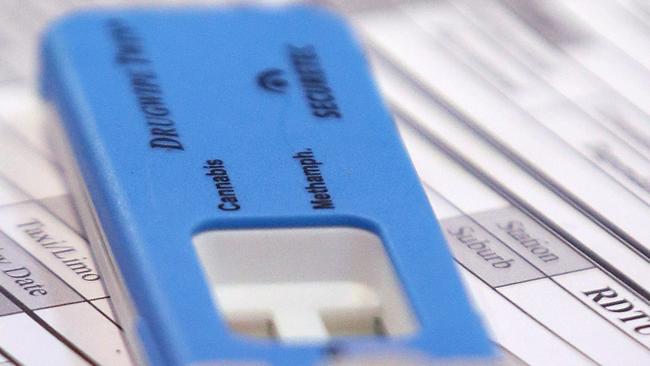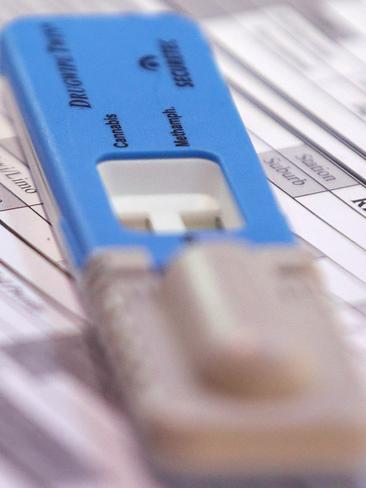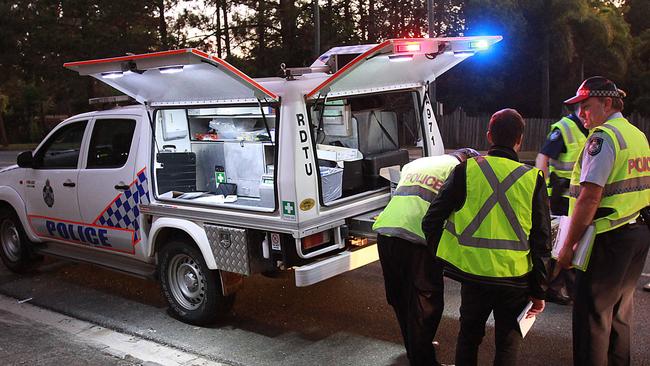Are you at risk of failing a roadside drug test after a wild weekend?
IF you took any drugs over the weekend, would you fail a drug test on Monday? A forensic toxicologist reveals all.

EVER wondered if you took a joint or party pill over the weekend whether it would put you at risk of failing a roadside drug test on Monday?
Forensic toxicologist Andrew Leibie has the answer on a saliva tests about 12-24 hours after drug consumption.
“It’s important to know that different tests have different periods of detection,” Mr Leibie said.
“Urine testing typically can detect drugs in the body for much longer than saliva tests.
“And blood testing is different again but it’s the saliva testing that police do in roadside tests so the drugs are only detected while they’re still psychoactive.”

Mr Leibie said the length of time illicit drugs remained in each user’s system varied from one individual to another but that it was “extremely rare” for cannabis or methamphetamine to be detected on roadside screenings days or weeks after being consumed, when the drug was no longer psychoactive.
“It’s hard to talk generally because every individual’s metabolism and health status is different as well as the amount of the drug they’ve consumed,” he said.
“But if we’re talking — someone takes a drug on Saturday night and gets a saliva test on Monday morning — it’s very, very unlikely they’ll get a positive result, but theoretically not impossible.”
A saliva drug test is deemed positive under the current Australian oral drug testing standards (AS 4760) for readings of or above 25 nanograms per milligram of THC (the active ingredient in cannabis) or 50 nanograms per milligram for methamphetamine, including MDMA.
Saliva tests are currently used in various Australian states and territories to detect illicit drugs but are not yet used to screen for many prescription drugs, including benzodiazepines, which can impair drivers.
“Saliva testing is a bit like breathalysers,” Mr Leibie said.
“Generally speaking, cannabis usually won’t be detected after 12 hours but if someone is smoking a large amount regularly it might be up to 24 hours in extreme cases but in most cases it would be normal to not show up after five to six hours.
“For ecstasy and ice, which are all a part of the methamphetamine group, we’re fairly confident saliva testing will detect the drugs for up to 24 hours or 36 hours in absolute extreme environments where there might be confusion or liver damage.
“What they’re looking for in a saliva test is the active drug — the part of the drug that’s psychoactive that’s causing effect.
“In the urine test we’re looking for the metabolised drug — after the drug has been consumed and your liver has changed the drug and excreted in urine — and that takes time to occur.”

Mr Leibie said it was not yet known how long new drugs on the market, including flakka and synthetic cannabis, stayed in a user’s system.
“We know these drugs, cannabis and methamphetamine; have a very deleterious effect on your driving performance,” Mr Leibie said.
“No doubt they will have an effect and impact on their ability to drive safely.
“But what we can’t say is that by taking the drugs it means the user is impaired.
“A roadside drug test alone cannot be considered evidence of impairment. Police collect a saliva sample and that goes back to the lab which is built around Australian standards.
“There’s a big push from unions for workplace drug testing to be saliva testing instead of urine is because then the results aren’t about what the person did on the weekend. They’re only about whether or not workers are at risk or going to impact others.”
Mr Leibie’s comments came after NSW Greens MP David Shoebridge slammed NSW Police over the use of roadside saliva drug tests and claimed documents obtained by the NSW Greens under freedom of information laws revealed there was no proof the tests were effective.
“They show there is no lower limit of drugs detectable in the saliva of people subjected to the roadside oral drug tests, and no proof the tests are effective in preventing crashes,” Mr Shoebridge said.
Mr Shoebridge told news.com.au the tests were “a waste of money” that undermined the legal system by “making it a de facto criminal offence of having potentially minuscule quantities of drugs present in your system”.
He said the saliva tests sent by police to labs were screened for the presence of drugs but failed to test for drug levels.
“They’re testing for a trace element sensitivity whereas it needs to be for levels and then we can be a fully informed public,” Mr Shoebridge said.
The FOI documents showed the tender to provide the screening kits was worth $6 million over four years to 2018.
“Despite four decades of police having the war on drugs they haven’t had a measurable impact on society,” Mr Shoebridge said.
“We need to have roadside drug testing that tests for all drugs and for impairment.
“Without that it’s a grossly misguided policy.”
Assistant Commissioner John Hartley of the Traffic and Highway Patrol Command, told Fairfax the tests were “a strong program aimed at deterring people who take illegal drugs from driving a motor vehicle”.
“Between 2010 and 2014, 14 per cent of all fatalities involved a driver or rider with an illegal drug in their system,” he said.
One in three tests this year has returned a positive test result in NSW alone, compared to one in 300 alcohol tests.
More than 30,000 roadside drug tests are carried out in NSW each year, with that number set to increase to 97,000 by 2017.




